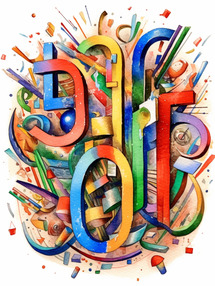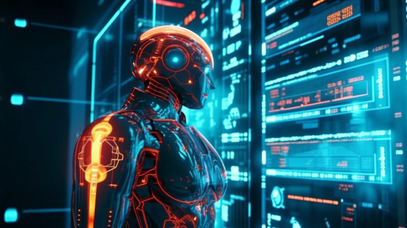The Rise of AI in Search and Content Creation
- Home
- The Rise of AI in Search and Content Creation
The future of search and content marketing is both human and AI-powered. While artificial intelligence transforms how we discover and engage with information online, human expertise remains irreplaceable. Success in this new landscape requires a collaborative approach, with AI and people working to achieve what neither can alone. The possibilities are endless when AI's scale and precision meet human creativity, empathy and storytelling.
Are you ready to launch your content strategy by fusing high-tech tools and human skills? The answer can only be yes if you commit to making a meaningful impact.
Table of Content
- AI is Transforming Search and Content, But Humans Still Reign Supreme
- The rise of AI models like MUM in search and content
- AI cannot replace human intelligence and expertise
- High-Quality, Expert Content is Crucial in the AI Age
- AI relies on human data and content to function
- Cheap, low-quality content will not rank or provide value
- Experts and authority still matter in content creation
- Following Google's EAT Methodology to Develop High-Quality Content
- Establishing expertise through an omnichannel content strategy
- Demonstrating authoritativeness through objective, well-researched content
- Creating trustworthy content that is honest, transparent and factual
- Optimizing Content for the AI-Powered User Experience
- How AI enhances search and discovery with customized results
- Optimizing content with compelling headlines, intros and summaries
- Examples of content that ranks well for featured snippets
- The Future of Content Creation: Humans and AI Teaming Up
- AI takes over repetitive, manual tasks like research and drafts
- Humans focus on high-level strategy, storytelling and creativity
- A vision for efficient collaboration between humans and AI in content creation
AI is Transforming Search and Content, But Humans Still Reign Supreme
Artificial intelligence has advanced rapidly in recent years and is shaping the future of search and content creation. Google's latest multimodal AI model, MUM, can understand information across various formats like text, images, and video. MUM is poised to significantly improve Google's search results and featured snippets, with the ability to generate coherent content from various data sources.
While AI systems like MUM indicate how technology can enhance our efforts, human intelligence and expertise remain irreplaceable. Artificial Intelligence relies on vast human data, content, and contextual cues. As advanced as these systems have become, they lack the human skills required for truly compelling storytelling, complex strategic thinking, and creative imagination.
Studies show AI's growing role, but strong preference for human content creators. According to the 2019 State of Marketing AI report, 61% of marketers believe AI helps their team be more impactful. However, 55% believe AI is most effective when created by human marketers.
The 2021 Content Marketing Survey by CMI and MarketingProfs reports that 53% of marketers expect to increase the use of AI for content creation, yet 86% still believe content from an expert human is most impactful.
AI in marketing and content is still in a nascent stage. While new models enable computers to write ebooks, blog posts and more, the majority of output is basic, repetitive and lacking in strategic value. AI cannot match the human judgment, empathy and creativity required for persuasive communication and memorable storytelling. With the right balance,
AI can take over mundane tasks like research and draft content generation, freeing human content creators to focus on high-level strategy. But the key value of expertise, creativity, and strategic thinking will remain profoundly human.
AI has a growing yet still limited role in search, content and marketing. While Google's latest innovations and other models are enabling more advanced automation, human intelligence remains far superior for the complex challenges of content strategy, creativity and meaningful storytelling. For the foreseeable future, AI's true power lies not in replacing humans but in complementing them. The combination of human and artificial expertise may be the best approach of all.
High-Quality, Expert Content is Crucial in the AI Age

While AI is gaining ground, expert human content creators remain essential. AI systems rely on massive volumes of data, content and human contextual cues to function. For AI to power innovative search features or generate new content, it needs data to analyze and learn from. High volumes of cheap, low-quality content created at scale will not drive business results or rank well in search. For true success, expert, experience-driven content is key.
AI models require ongoing training, and human expertise drives machine learning. As advanced as models like Google's MUM have become, they cannot replicate human judgment, emotion, and creativity overnight. With each new insight or advancement, AI models go through rounds of machine learning, a process that relies on huge amounts of data which only experts can develop and curate. AI-generated content or strategy will never match expertise born of hard-won experience.
Low-quality content lacks strategic value and business impact. While some look to AI expecting it will reduce costs by generating content at high volumes, the results lack substance and do not achieve key goals like lead generation or brand-building. Authority and reader trust are far harder to build and rely on demonstrated expertise. Studies show a preference for and superior performance of content from reputable human experts and brands.
Cheap, low-quality content is not sustainable for rankings or credibility. AI systems generating swaths of spun content, copycat templates or thin pages may achieve volume but not results. Google's standard of EAT - Expertise, Authoritativeness and Trustworthiness - highlights the ongoing need for quality over quantity. Expert human content creators play an invaluable role that cannot be automated or easily replicated.
Expert human content creators remain essential in the age of AI. High-volume, low-quality content will not rank, perform or provide strategic value, regardless of its source. While new search features and content creation tools show the promise of AI, they continue to rely on human data, judgment and expertise. For sustainable success, that human touch and an unyielding standard of quality remain profoundly important. When experts and AI work in unison, they may just prove unstoppable. But the technology is not quite ready to stand alone.
Following Google's EAT Methodology to Develop High-Quality Content
 Google's standard of EAT - Expertise, Authoritativeness and Trustworthiness - highlights the elements of high-quality content. Developing authoritative, expert content that ranks well in search requires an EAT-first strategy.
Google's standard of EAT - Expertise, Authoritativeness and Trustworthiness - highlights the elements of high-quality content. Developing authoritative, expert content that ranks well in search requires an EAT-first strategy.
Expertise: Become a recognized authority through an omnichannel content strategy. Establish your expertise by contributing high-value social media posts, creating a professional bio, and publishing guest posts on industry websites. Optimize your social profiles and participation in industry forums and communities. Develop a content framework that focuses your efforts, and sticks to a consistent content calendar.
Authoritativeness: Conduct thorough research and convey information in an unbiased manner. Back up key claims with data and statistics from reputable sources. Compare multiple sides of an issue objectively. Provide well-reasoned advice and opinions based on facts. Create comprehensive, in-depth resources on topics where you have expertise.
Trustworthiness: Produce content that is transparent, honest and factual. Disclose any potential conflicts of interest, and link to sources for statistics or facts. Create a reasonable balance of promotional and non-promotional content. Monitor and promptly correct any inaccuracies. Portray products, services or brands objectively and truthfully based on factual evidence. Establish a record of accurate, ethical content over the long term.
Other elements of high-quality, EAT-compliant content include:
- Ensuring content is safe, legal and avoids actively promoting harm.
- Using a professional, polished writing style with minimal errors or inconsistencies.
- Employ mobile-friendly formatting and a logical flow or structure.
- Optimizing content for search and discovery by utilizing effective titles, headers, and meta descriptions.
- Updating content regularly to keep information current. Outdated or stale content loses authoritativeness and trustworthiness.
- Balancing the needs of both human readers and search engines with compelling content that ranks well in search results.
By focusing on expertise, authoritativeness and trustworthiness, content creators and brands can develop high-quality content that resonates with readers and ranks highly in search. An EAT-first strategy leads to building a credible and authoritative online presence that search engines and people alike find valuable.
Optimizing Content for the AI-Powered User Experience

As AI continues advancing search and personalization, the user experience is becoming more customized and compelling. Google's latest search model can understand user intent across contexts and formats, helping match queries with the most relevant, helpful content.
To optimize for this AI-driven user experience, content should be:
- Compelling: Leverage emotive language and storytelling techniques to make an immediate emotional connection with readers. Use an engaging writing style and logical flow to keep people interested.
- Personalized: Create resources that specifically target key personas or buyer journeys. Address common questions, pain points and needs. Highlight relevant case studies, examples and solutions for your target audience.
- Concise: Frontload key information using an attention-grabbing headline and intro paragraph. Use bullet points, numbered lists, and bold text to convey information quickly. Provide short summaries at the beginning of longer posts. Give the gist so users can decide to dive in or move on.
- Discoverable: Prioritize elements like strategic page titles, meta descriptions and headings to help search engines and users determine content relevancy. Optimize for featured snippet opportunities by answering common questions or queries concisely and directly.
- Evergreen: Produce content that will continue driving value for the long term. While discussing the latest trends or news, provide broader advice and key principles that remain relevant. Update older evergreen content to keep it comprehensive and timely.
Examples of content that ranks well for featured snippets and optimizes the AI-powered experience include:
- Blog post: How to Use Video in Your Content Marketing Strategy. Short intro paragraph, headings for key types of video content, bulleted list of video strategy steps. Ranked for "How to use video in content marketing."
- Resource page: The Beginner's Guide to SEO. Clear page title, optimized meta description. The opening summary of key SEO elements, followed by headings for topics like keyword research, technical SEO, and link building. Ranked for "beginner's guide to SEO."
- Video: How to Choose the Right Keywords (5-Step Blueprint). Engaging host, with on-screen steps: research, analyze the volume, check difficulty, fit your strategy, and use long-tail keywords. Ranked for "how to choose keywords."
- Interactive tool: Content Idea Generator. Short intro paragraph and a bulleted list of suggested content types. Fillable fields to generate custom blog posts, videos, and social media ideas based on keywords or topics. Ranked for "content idea generator."
Optimizing for search engines and the AI-driven user experience can help your content rank higher in search results and better engage your target audience. With a strategic focus on elements like concise yet compelling intros, scannable formatting, and discoverability, your content and brand gain more relevance and authority.
The Future of Content Creation: Humans and AI Teaming Up

The future of content creation lies in collaboration between humans and artificial intelligence. With AI to power repetitive, manual efforts and humans leading on strategy, creativity, and storytelling, content development may become faster and more efficient than ever before.
AI's Role: AI can take over time-consuming tasks that don't require human judgment or emotion. This includes:
- Research: Gathering data, facts, statistics, examples, and case studies on a topic. Pulling key findings and citation information to build out a draft content outline.
- Content generation: Using natural language processing to develop a first draft of a blog post, resource page or other informational content based on a human-provided outline. AI would generate the initial copy, which humans can then edit and optimize.
- Graphic design: Creating basic visuals like charts, graphs, icon arrays or other illustrations based on details provided by a human content creator. AI may be able to generate first drafts of images humans can customize.
- Personalization: Analyzing attributes of key personas or audience segments and generating tailored content outlines, copies or experiences suited to specific needs, behaviours and interests. Humans would determine key details for the personas; AI would suggest customized approaches.
Human's Role: Humans remain essential for:
- Strategy: Develop a cohesive content strategy and framework based on business goals. Determining content types, topics, personas, journeys and funnels. Deciding on a consistent brand voice and style.
- Storytelling: Crafting a compelling narrative and memorable stories that forge an emotional connection with readers. Showcasing drama, conflict and resolution in an authentic way that AI may struggle to replicate.
- Creativity: Bringing an artistic, innovative flair to content. Developing truly unique ideas, presentations of information, visual designs, or interactive experiences. Thinking outside of established content templates or frameworks.
- Final edits: Polishing AI-generated draft content outlines, copies, or other materials. Ensuring accuracy, brand consistency, and high quality in the end result before any content goes live.
- Relationship-building: Directly interacting with audiences, customers, and communities to foster engagement and brand loyalty. Addressing feedback or issues with a human touch. Building real connections through personalized outreach or events.
With each focusing on their strengths - AI on scale and repetition, humans on creativity and emotion - content creation may reach new heights of efficiency, impact, and strategic value. The future is collaborative, and the possibilities for AI and human teams are endless. But the human touch will undoubtedly remain.
Conclusion: AI and the Evolving SEO Landscape: What the Future Holds
Search, content and digital marketing are undergoing a transformation enabled by AI. Technologies like Google's MUM model are enhancing how people discover and engage with content. However, human intelligence remains irreplaceable for the high-level strategic thinking, creativity, emotional connection, and storytelling that fuel real results.
Success requires an optimized and collaborative approach. AI can generate draft outlines, copy, and visuals at scale, based on initial human input. But the lasting authority and relationship-building rely on personal expertise. A strong content strategy, targeting key audiences, making genuine connections, and forging a cohesive brand narrative - depends profoundly on human judgment.
The future is both high-tech and high-touch. AI will free expert content creators to focus on the work only they can do. But the work itself - understanding customers, crafting stories, and building credibility and trust over the long term - calls for uniquely human skill.
The technologies transforming SEO and inbound marketing deserve attention but not apprehension. AI can bolster efforts through intelligent automation but not replace the strategic human behind an insightful content experience or brand.
For content creators, the path is clear. Keep developing expertise and share it generously. Build a framework for an authoritative content experience around your best insights. Let technology elevate your efforts through accuracy and scale, but not by sacrificing credibility or emotional resonance. Look for tools and partnerships to streamline the mundane and unleash creativity.
The future of content is unquestionably tech-driven but indisputably human-centred. As it should be. The greatest search and discovery experiences of tomorrow will come through AI and people working side by side, each playing to their strengths in pursuit of something game-changing but profoundly familiar: the timeless human connection at the heart of it all. Our future is fusion - are you ready? If you commit to expertise, empathy and making meaningful change, the answer can only be yes.
Frequently Asked Questions
Will AI replace human content creators?
No, AI cannot replace human intelligence and expertise. While AI is transforming content creation by automating repetitive tasks, human judgment is still required for high-level strategy, creativity, relationship-building, and storytelling. AI relies on data that human experts develop, curate and optimize. The future of content is collaborative, with AI and people working together, each focusing on their strengths.
How should I prepare for AI in content creation?
Develop your expertise and establish authority through an omnichannel content strategy. Contribute to industry publications, optimize your social profiles, build a compelling brand narrative, and publish high-value resources for your audience. Focus on forging real connections with people. Consider tools or partnerships to gain efficiencies, but don't sacrifice the human touch. With expertise and empathy, you're ready to leverage AI.
Will low-quality or AI-generated content rank in search?
Not in the long run. Google's standard of EAT (Expertise, Authoritativeness, Trustworthiness) highlights the need for quality. While high volumes of cheap, low-quality content may achieve scale, they won't provide value or sustainable results. Google is committed to providing the most relevant, helpful content in search results regardless of its source (human or AI). But credibility and expertise are still decisive factors.
Should I optimize for AI or people?
Optimize for both. Compelling, scannable and personalized content will engage people and rank well in AI-driven search. Focus on elements like strategic page titles, intros, headers and bullet points to satisfy both search engines and human readers. Provide value and solutions for key audience segments. Find the right balance of self-promotion and information to achieve authoritativeness. Keep content fresh and evergreen. What's good for AI can be good for people, and vice versa.
How will SEO and content marketing change?
SEO and content will require a high degree of personalization and optimization for new search and discovery models. Technical SEO and metrics will matter more, as well as understanding your target audiences and buyer journeys to provide the most relevant experiences. Authoritative, multimedia and interactive content types may be preferred. With AI in search, both technical excellence and human connection will be key - expertise, empathy and emotion will strongly influence results. The lines between search, social, and content marketing will continue to blur in new ways. But fundamentals like relationship building, storytelling and value creation will endure.
The future belongs to those fusing high-tech tools and data-driven insights with profoundly human judgments and skills. Visionary content creators will leverage AI not as a threat but as an opportunity to do what only they can do even better. The path ahead may not be clear, but the imperative is: to bring your best to the partnering of person and machine and prepare for incredible things.




